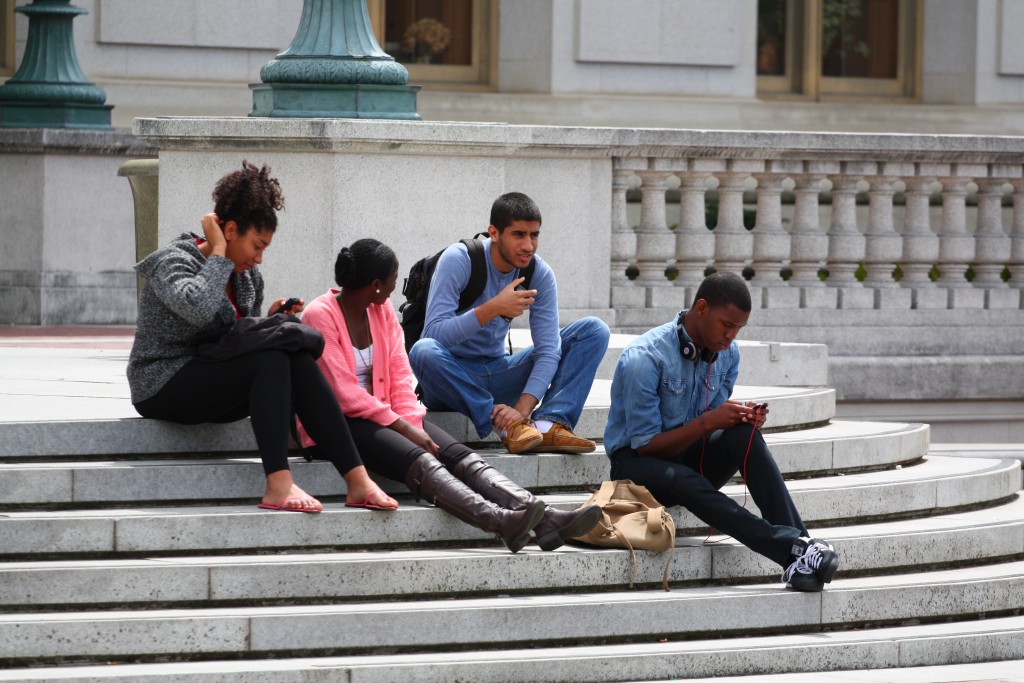Responsible Digital Citizenry
by Michelle Ciccone; JFYNetWorks Blended Learning Specialist
We call young people today “digital natives” because they’ve never known a time when the Internet, smart phones and social networks were not a part of everyday life. We believe that young people are somehow naturally endowed with certain capabilities when it comes to working with digital devices and the Internet.
While this may seem true because we older folks struggle to keep up with the ever-changing technological landscape – feeling like “digital immigrants” on the flipside of the “digital native” narrative – assuming that all young people have these capabilities glosses over the actual experience for so many in the infosphere.
Danah Boyd, Principal Researcher at Microsoft Research and NYU professor, wrote convincingly on this issue in her 2014 book, It’s Complicated: The Social Lives of Networked Teens. “Teens may make their own media or share content online, but this does not mean that they inherently have the knowledge or perspective to critically examine what they consume,” she writes (p. 177). Boyd describes a “digital divide” among young people in terms of “level of access and types of competencies” (p. 193), a nuance she noticed many times in her fieldwork interviewing teens across the country from all socio-economic backgrounds. “The differences weren’t noticeable when it came to navigating Facebook for social purposes. They appeared when I watched how both privileged and disadvantaged teens turned to social media to get information and support” (p. 194).
This last observation is the key. The Internet has made information available to all, but it’s the process of converting that raw information into knowledge – and then turning that knowledge into opportunity – that is elusive to so many technology users. Boyd observes that “many of the technologies that youth encounter, from Google to Wikipedia, require users to engage critically with the information they’re seeing” (p. 180).
It’s not just young people who have trouble in the infosphere. How many of us receive chain emails from adult family and friends, spreading one conspiracy theory or other, citing dubious sources as proof. If you Google it, it must be true– right?
The truth is, being critical consumers of information is hard for people of all ages. Young people must be taught how to gather, analyze, and act on information found via technology. In Digital Community, Digital Citizen, Jason Ohler writes that we must teach students “not only how to use technology but also when and why” (p. 9). “The bottom line is that children now have to begin to think more abstractly at younger ages… Clearly, it is the role of schools to help them cultivate the skills and perspectives they need to participate in the infosphere safely and responsibly, as well as boldly and with a sense of hope and adventure about the future” (p. 4).
In education we often refer to this new set of skills and perspectives necessary for the digital age as “digital citizenship.” To educate responsible “digital citizens” we teach students to vet and analyze information found on the Internet; to treat with respect other members of the online communities they take part in; and to use digital tools to actively engage with 21st century civic institutions.
Some young people are farther down the road towards digital citizenship than others. The differences have to do with the digital divide that Boyd describes – a divide in terms of level of access and types of competencies. Not all young people have the same skills, abilities, and access to technology; and grouping all young people into the category of “digital natives” ignores the fact that many, if not all, young people (not to mention adults) must be taught explicitly how to use technology to their own benefit—and in their own defense.
JFYNetWorks Helps Prepare for Digital Citizenship
JFYNetWorks is working with longtime partner Revere High School in a new venture to help prepare young people for digital citizenship. Collaborating with visionary Superintendent Dr. Paul Dakin, a true digital pioneer, we are incorporating digital citizenship topics into the school’s Civics course, a new graduation requirement for seniors.
In this course students explore:
-
• Expectations of citizenship in the 21st century (Have they changed?)
-
• Activism in the digital age (How effective is “hashtag activism”?)
-
• Understanding how governments and corporations use information about us found online (What is “meta-data”?)
-
• Rights to privacy in a digital age (Have they changed since the Founding Fathers articulated them?)
-
• The role that the Internet and networked technologies play around the world (Is the Internet “the great democratizer” we once thought it could be?)
Students are asked to vet information they find online, examining the veracity of both content and author. As a culminating project, students develop proposals to address technology-related policy gaps at the federal, state, city and school levels. The focus throughout is on letting students actively engage with technological tools and the information that can be accessed with those tools. We piloted the course this year. Check back for updates on our progress and to learn about our students’ experiences as they explore what it means to be an active and responsible citizen in the digital 21st century.
We believe that it simply isn’t accurate to assume that because young people grow up with technology they know how to use it wisely or safely. It’s our job as educators – and parents– to empower students to be active and responsible participants in the infosphere. We have to give them the tools, and the skills, necessary to generate knowledge and opportunity for themselves and their communities, and to achieve their own goals.
Our democracy depends on it.





